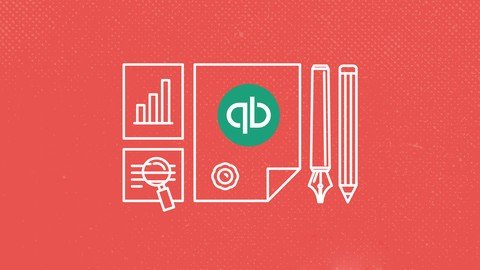
Last updated 1/2017
MP4 | Video: h264, 1280x720 | Audio: AAC, 44.1 KHz
Language: English | Size: 657.88 MB | Duration: 7h 43m
From invoicing to inventory, this tutorial will give you control over your small-to-medium sized business accounting.
What you'll learn
manage inventory and sales for products and services
create custom invoices and sales forms
track ongoing expenses and manage linked bank accounts
Requirements
a working copy of QuickBooks 2015
Description
Small business accounting does not have to be difficult, with right software and the ability to use it. In this course you will learn how to create a company file, navigate the QuickBooks interface, and utilize a variety of accounts, registers, forms, reports, and centres. This course is designed for the absolute beginner, meaning no accounting or QuickBooks experience is required. You will start by learning how to navigate the QuickBooks interface, then jump into learning to create a new company file. From there, Erin will show you how to work with QuickBooks lists, manage products and services, and monitor bank accounts. This video tutorial also covers how to track customers, add new customers, and use the customer centre. You will also learn how to account for sales tax, make sales, create invoices, and customize sales forms. Finally, you will learn how to manage accounts payable and receivable, set security and preferences, and back up and verify your company files. Once you have completed this computer based training course, you will be fully capable of creating a company file that will allow you to manage all of your accounting needs and business finances.
Overview
Section 1: Series Overview
Lecture 1 Important - Download These First - Working Files
Lecture 2 Getting Equipped For QuickBooks
Lecture 3 How To Access Your Working Files
Section 2: QuickBooks Quick Start
Lecture 4 QuickBooks Quick Start
Lecture 5 New Features In QuickBooks 2015
Lecture 6 Working With An Existing Company File
Lecture 7 Getting Around In QuickBooks
Lecture 8 Writing Checks
Lecture 9 Making Cash Sales
Lecture 10 Using The Calendar
Section 3: Getting Equipped For QuickBooks
Lecture 11 Getting Equipped For QuickBooks
Lecture 12 Accounting Primer - Part 1
Lecture 13 Accounting Primer - Part 2
Lecture 14 Accounting Primer - Part 3
Lecture 15 Preparing To Setup A Company File
Lecture 16 Creating A New Company File
Section 4: Understanding QuickBooks Lists
Lecture 17 Understanding QuickBooks Lists
Lecture 18 Working With QuickBooks Lists - Part 1
Lecture 19 Working With QuickBooks Lists - Part 2
Lecture 20 Organizing QuickBooks Lists
Lecture 21 Enabling Account Numbers And Adding Accounts
Section 5: Managing Products And Services
Lecture 22 Managing Products And Services
Lecture 23 Working With Vendors - Part 1
Lecture 24 Working With Vendors - Part 2
Lecture 25 Entering Products And Services
Lecture 26 Ordering And Receiving Products - Part 1
Lecture 27 Ordering And Receiving Products - Part 2
Lecture 28 Making Inventory Adjustments
Lecture 29 Returning Items To Vendors
Lecture 30 Generating Inventory Reports
Section 6: Monitoring Bank Accounts
Lecture 31 Monitoring Bank Accounts
Lecture 32 Creating Bank Accounts
Lecture 33 Working With Registers
Lecture 34 Transferring Funds Between Accounts
Lecture 35 Reconciling Bank Accounts
Section 7: Tracking Customers
Lecture 36 Tracking Customers
Lecture 37 Adding Customers
Lecture 38 Configuring Custom Fields
Lecture 39 Defining Customer Jobs
Lecture 40 Using The Customer Center
Lecture 41 Building Business With The Lead Center
Section 8: Accounting For Sales Tax
Lecture 42 Accounting For Sales Tax
Lecture 43 Setting Up Sales Tax
Lecture 44 Generating Reports And Paying Liabilities
Section 9: Making Sales
Lecture 45 Making Sales
Lecture 46 Using Estimates
Lecture 47 Creating Invoices
Lecture 48 Making Returns And Creating Credit Memos
Lecture 49 Leveraging Integrated Email Capabilities - Part 1
Lecture 50 Leveraging Integrated Email Capabilities - Part 2
Section 10: Customizing Sales Forms
Lecture 51 Customizing Sales Forms
Lecture 52 Making Basic Form Customizations
Lecture 53 Working With Additional Form Customizations
Lecture 54 Advanced Customization With The Layout Designer
Lecture 55 Downloading And Importing Templates
Lecture 56 Creating Consistency With The Forms Customization Tool
Section 11: Managing Accounts Receivable And Payable
Lecture 57 Managing Accounts Receivable And Payable
Lecture 58 Using The Income Tracker
Lecture 59 Assessing Finance Charges And Generating Statements
Lecture 60 Receiving Payments And Making Deposits
Lecture 61 Paying Bills And Printing Checks
Section 12: Setting Security And Preferences
Lecture 62 Setting Security And Preferences
Lecture 63 Establishing Users And Permissions
Lecture 64 Customizing QuickBooks Preferences
Section 13: Taking Care Of Business
Lecture 65 Taking Care Of Business
Lecture 66 Getting The Big Picture With Company Snapshot
Lecture 67 Closing The Books
Lecture 68 Backup Best Practices
Lecture 69 Backing Up, Verifying And Rebuilding Company Files
Section 14: Conclusion
Lecture 70 What You Now Know
small business owners and those wanting more flexibility and control in tracking and managing business sales and expenses
Homepage
https://www.udemy.com/course/learning-quickbooks-2015/Links are Interchangeable - No Password - Single Extraction



